Key takeaways:
- Ocean conservation is vital for maintaining marine ecosystems, providing food, and supporting livelihoods, emphasizing the interconnectedness of marine life.
- Critical threats to oceans include plastic pollution, overfishing, and climate change, necessitating immediate action through sustainable practices and awareness.
- Community engagement fosters collective action for marine protection, with initiatives like beach cleanups and education promoting responsibility towards ocean health.
- Effective strategies include establishing marine protected areas, promoting sustainable fishing practices, and engaging in citizen science to foster community involvement and positive change.

What is Ocean Conservation
Ocean conservation refers to the protection and preservation of marine environments and their ecosystems. It involves efforts to maintain the health of oceans, ensuring that the delicate balance of marine life can thrive. I often reflect on my own encounters with the ocean and wonder: How can we truly appreciate its beauty without actively working to protect it?
Every time I go snorkeling, I am reminded of the vibrant ecosystems that exist beneath the waves. It’s astonishing to see coral reefs teeming with life, yet heartbreaking to think that many face threats from pollution and climate change. Does this recognition spur you to consider the impact of your actions on these fragile ecosystems?
Moreover, ocean conservation encompasses a broad range of activities, including reducing plastic use, advocating for sustainable fishing practices, and promoting marine protected areas. I vividly remember a beach cleanup I participated in, where I collected countless plastic items that would have otherwise harmed marine creatures. It’s experiences like this that fuel my commitment to advocating for the health of our oceans.
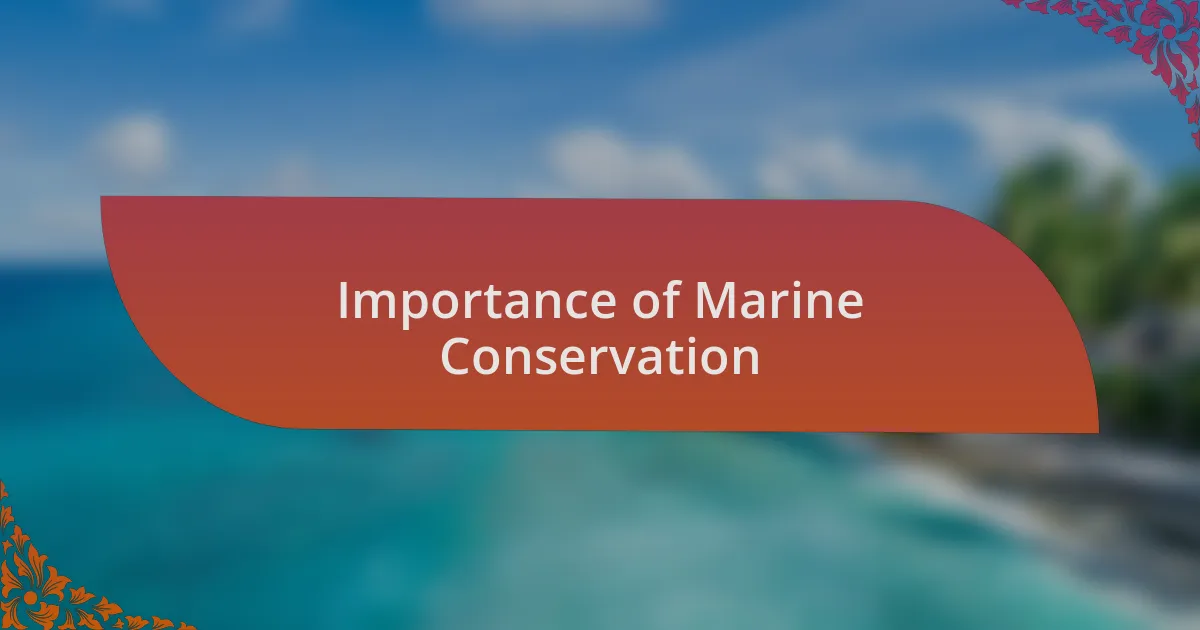
Importance of Marine Conservation
The importance of marine conservation cannot be overstated. Healthy oceans provide us with food, regulate our climate, and support a vast array of wildlife. From my experience volunteering at a marine sanctuary, I’ve seen firsthand how diverse and interconnected marine life is. Each creature, no matter how small, plays a vital role in sustaining the ecosystem. Isn’t it fascinating to think that by losing one species, we could inadvertently affect many others?
Engaging in marine conservation also allows us to protect our livelihoods. Many communities rely on fishing and tourism, both of which depend on sustainable ocean health. I once chatted with a local fisherman who shared how declining fish populations impacted his family’s income. He emphasized that preserving our marine resources is not just an environmental issue; it’s a matter of economic survival for families like his. How can we turn a blind eye to such tangible consequences?
Moreover, the oceans are not just a resource; they are a source of joy and inspiration. Reflecting on my personal experiences by the shore, I often feel a deep emotional connection to the water. Whether it’s the sound of waves crashing or the sight of dolphins playing, these moments remind me why we must advocate for marine preservation. Do you feel that sense of wonder when you’re near the ocean? It drives home the point that protecting our seas ultimately enriches our lives in countless ways.
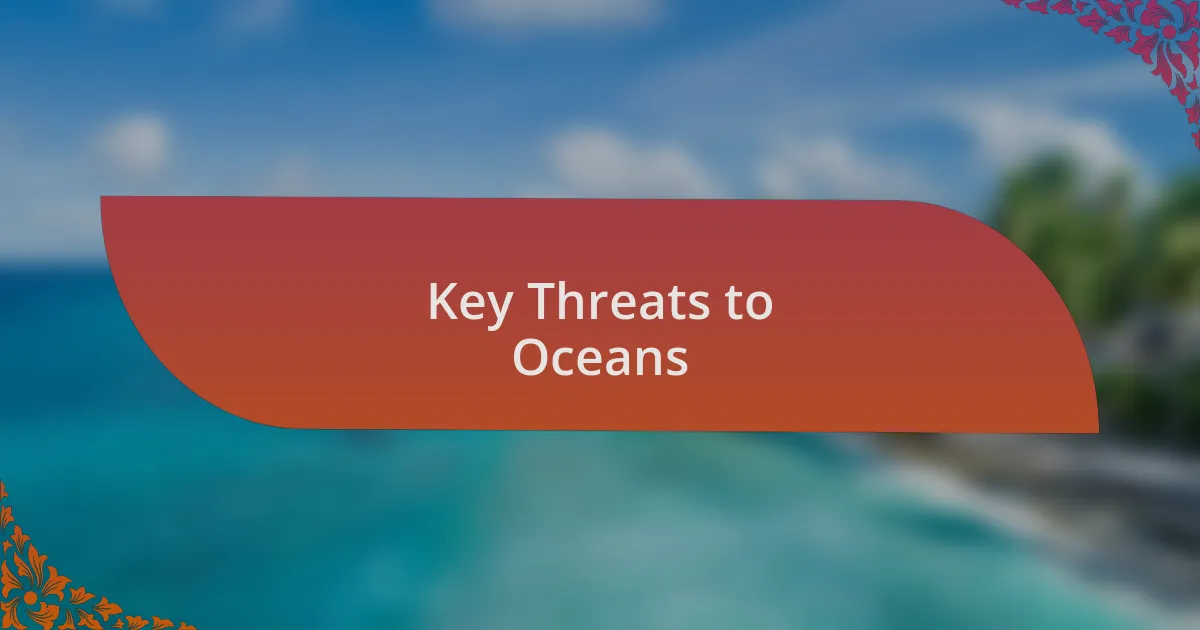
Key Threats to Oceans
The oceans are facing critical threats that we must acknowledge. One of the most alarming issues is plastic pollution. I remember walking along a beach and being disheartened to see plastic debris strewn across the sand. It hit me that this waste not only harms marine life but also diminishes the beauty of our shores. Have you ever stopped to think about where that plastic ends up?
Overfishing is another grave threat to ocean ecosystems. From my conversations with marine biologists, I’ve learned that excessive fishing practices disrupt the balance of marine populations. It’s not just about removing fish from the water; it’s about understanding the delicate web of life that depends on those species. How can we advocate for sustainable fishing methods that protect both our food sources and marine biodiversity?
Climate change looms over our oceans, causing coral bleaching and altering the habitats of countless marine species. During a scuba diving trip, I witnessed the stark contrast between vibrant coral reefs and those that had succumbed to bleaching. It’s heartbreaking to realize that these ecosystems, which once thrived, are now struggling to survive. What actions can we take to combat the effects of climate change on the oceans? Each small step we take can lead to significant changes in preserving these vital ecosystems.
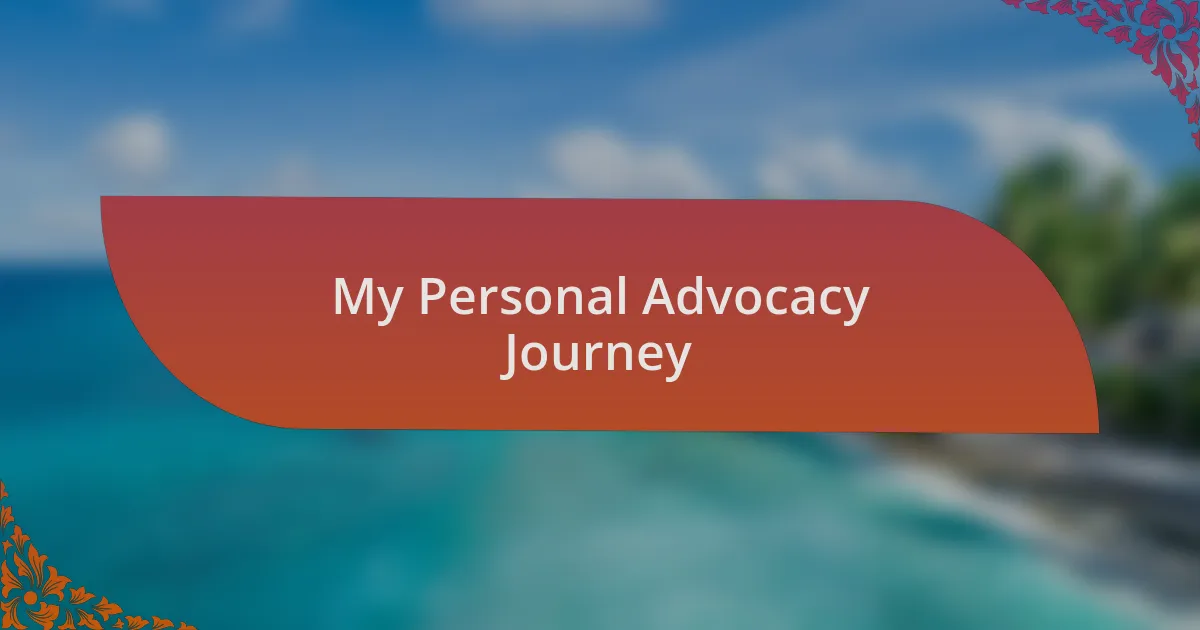
My Personal Advocacy Journey
When I first became aware of the urgency of marine conservation, it started with a simple trip to a local aquarium. I was mesmerized by the array of marine life, but that wonder quickly turned to sadness as I learned about the threats these creatures face. This duality of joy and despair ignited a passion within me. Have you ever felt the heartache of knowing something beautiful is in danger?
One significant moment in my journey occurred during a beach cleanup event I volunteered for. Standing side by side with fellow advocates, we collected countless bags of trash washed ashore. Each piece of litter felt like a reminder of our responsibility towards the ocean. I couldn’t help but wonder—what if more people took the time to understand their impact on marine health?
As my advocacy grew, I started to engage in conversations on social media about marine issues. I vividly recall a discussion where I shared research findings on the impact of climate change on sea turtles. The responses were stirring; people were surprised to learn how real these challenges are. It’s moments like these that fuel my commitment to raising awareness. How can we remain silent when our oceans need us now more than ever?
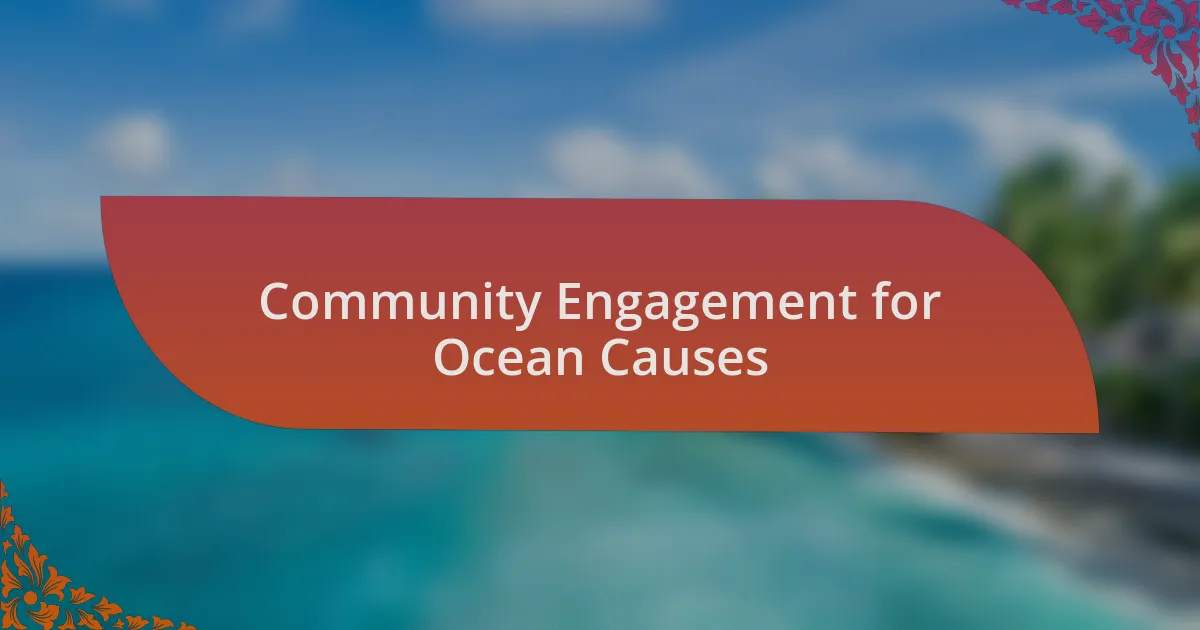
Community Engagement for Ocean Causes
Community engagement is crucial for ocean conservation because it fosters collective action. I remember attending a community meeting where local residents gathered to discuss the declining health of our coastal waters. The passion in the room was palpable; people from various backgrounds shared their experiences and ideas. Have you ever felt the strength of a united front? That night, I realized how essential it is to harness community voices to promote change.
In one memorable initiative, I helped organize a “Marine Awareness Day,” where families participated in interactive workshops. Children learned about the importance of reducing plastic use while parents engaged in discussions about sustainable fishing practices. Witnessing the excitement on the children’s faces made me reflect on our responsibility to educate the next generation. How can we inspire them to become stewards of our oceans?
I often find that our local beaches serve as a rallying point for community action. One summer, I joined a group of residents to advocate for a ban on single-use plastics in our area. We stood together, sharing our stories and urging local lawmakers to take action. The camaraderie felt electric, as if we were all part of something bigger than ourselves. What if every community embraced such collective enthusiasm for preserving our marine environments?
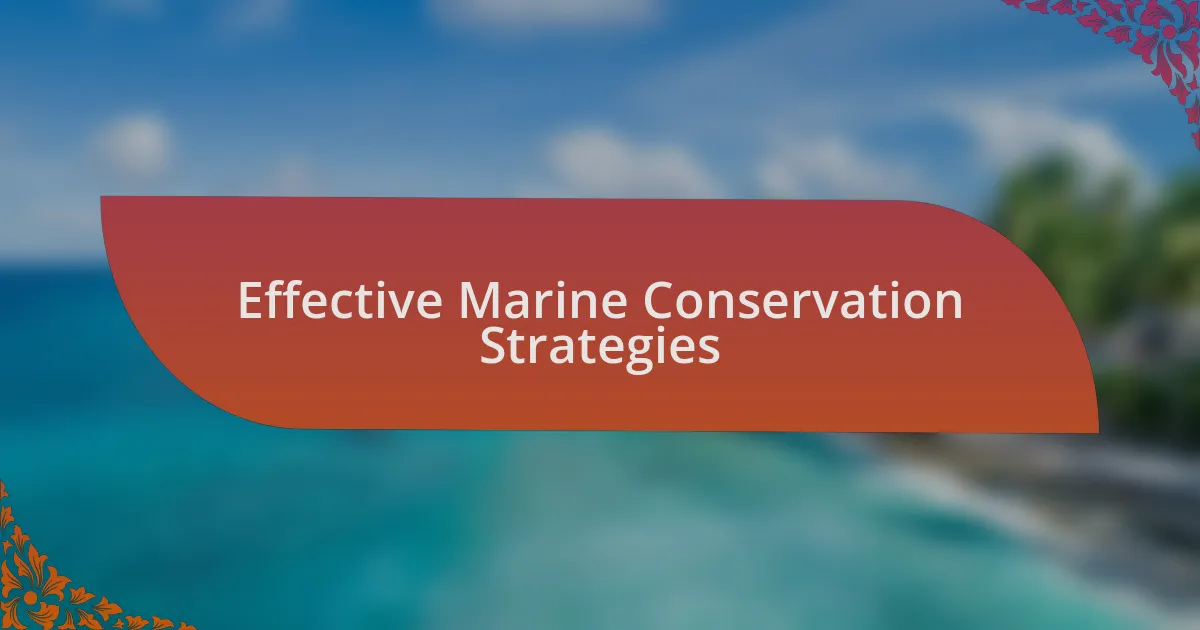
Effective Marine Conservation Strategies
One effective marine conservation strategy that I’ve witnessed firsthand is the establishment of marine protected areas (MPAs). I recall a trip to an MPA where the vibrant coral reefs contrasted sharply with the degradation present in nearby unprotected waters. While snorkeling, I was awed by the diversity of marine life thriving in a well-regulated space. Protecting these areas not only preserves biodiversity but also supports local economies reliant on healthy oceans. Have you ever considered how essential MPAs are, not just for marine life but for our livelihoods?
Another strategy I truly believe in is the promotion of sustainable fishing practices. During a recent workshop, I met a fisherman who transitioned from traditional methods to more sustainable techniques. He shared his journey and how it not only benefited the fish populations but also revitalized his business. The pride in his voice was contagious; it made me ponder how often we overlook the positive changes driven by conscientious choices. What if more fishermen followed his example?
Lastly, engaging in citizen science initiatives has proven to be incredibly impactful. I joined a local project where volunteers collected data on water quality and marine species. The sense of responsibility I felt, paired with the camaraderie among participants, was fulfilling. It amazed me how individuals coming together for a common goal can drive significant change. Have you thought about how your involvement in such initiatives could contribute to a healthier ocean?
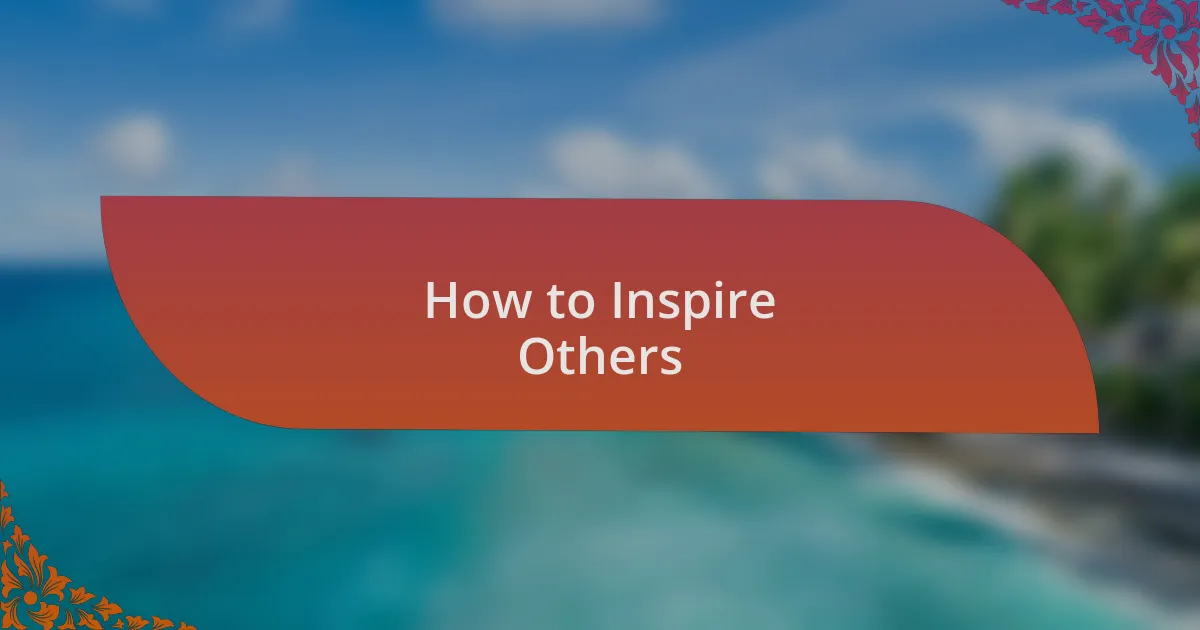
How to Inspire Others
Inspiring others to embrace marine conservation often starts with sharing personal stories. I remember a beach clean-up event where a young girl found a tangled piece of plastic while collecting litter. Her immediate reaction was a mix of horror and determination; she voiced her desire to protect marine life. Seeing her passion ignited a collective awareness within the group. Have you ever noticed how a single story can shift perspectives and motivate action?
Another powerful way to encourage others is to present tangible solutions. In my experience, hosting workshops where people can learn about sustainable practices can spark genuine interest. I once organized a session focused on creating ocean-friendly habits, from reducing plastic use to choosing sustainable seafood. The excitement in the room was palpable as people shared their simple yet effective changes. How might your knowledge inspire someone else to take the first step toward conservation?
Finally, leading by example can be incredibly influential. I once decided to document my own journey towards reducing my carbon footprint, sharing my successes and failures on social media. The feedback I received was overwhelming, as others began to share their own experiences and transformations. It made me realize how our accountability can encourage others to take their own initiative. Have you thought about how your actions might encourage someone to join the fight for cleaner oceans?